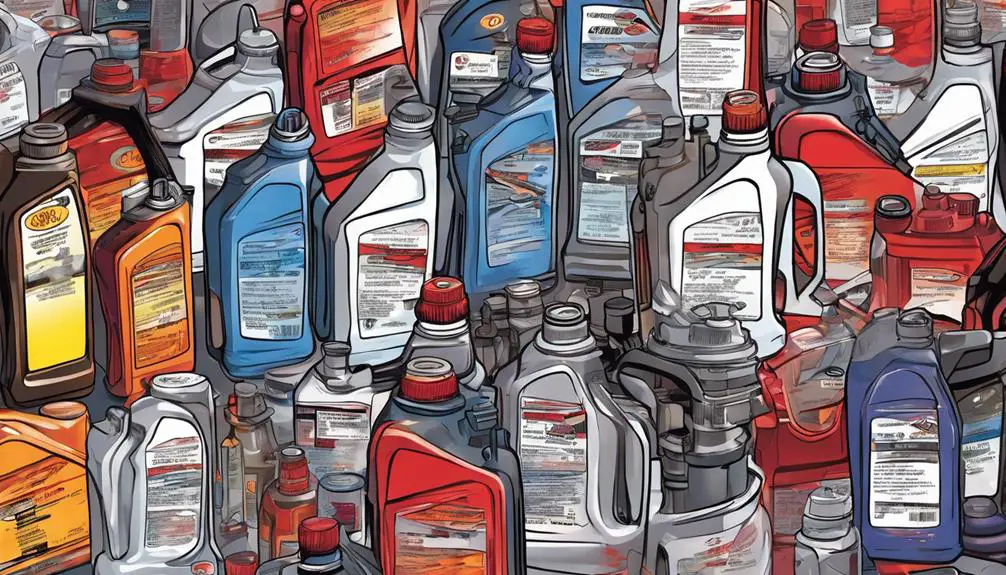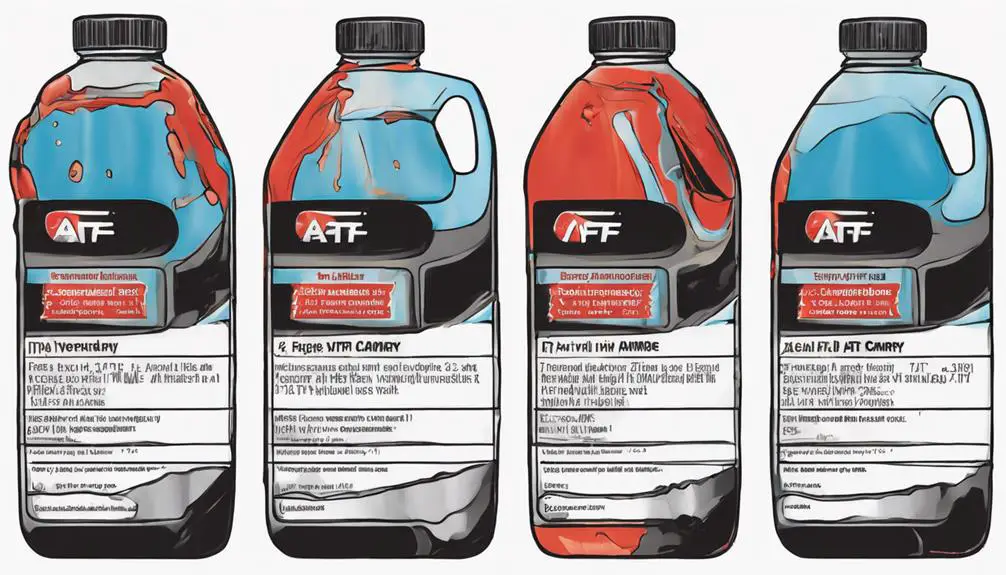When it comes to maintaining your Toyota Camry's transmission health, selecting the appropriate fluid is essential. Ensuring the right type of transmission fluid can greatly impact your vehicle's performance and longevity. But with a variety of options available, how do you know which one is the best fit for your Camry? Let's explore the factors that play a vital role in choosing the best transmission fluid to keep your Toyota running smoothly.
Key Takeaways
- Use Toyota Genuine ATF WS for optimal performance.
- Consider Full Synthetic ATF for enhanced protection.
- Multi-Vehicle ATF offers versatility across models.
- Choose OEM fluids for compatibility and warranty.
- Follow owner's manual for viscosity and grade ratings.
Importance of Transmission Fluid
Regularly replacing your Toyota Camry's transmission fluid is important for maintaining optimal performance and longevity of your vehicle's transmission system. Over time, transmission fluid can become contaminated with debris and lose its lubricating properties, leading to increased friction and wear on the transmission components.
By replacing the fluid at recommended intervals, usually every 30,000 to 60,000 miles, you can guarantee that your transmission operates smoothly and efficiently.
Old, dirty transmission fluid can cause shifting issues, such as delayed engagement or rough shifts between gears. Additionally, insufficient lubrication from degraded fluid can result in overheating and damage to the transmission, leading to expensive repairs.
Types of Transmission Fluid
There are several types of transmission fluid that are compatible with your Toyota Camry. When choosing the right one, consider the following:
- Toyota Genuine ATF WS: This is the original transmission fluid recommended by Toyota for most Camry models. It guarantees proper lubrication and performance while meeting the manufacturer's specifications.
- Full Synthetic ATF: If you're looking for enhanced protection and improved performance, full synthetic transmission fluids are a great option. They offer better resistance to heat and oxidation, extending the lifespan of your transmission.
- Multi-Vehicle ATF: For those seeking versatility, multi-vehicle ATF is designed to work with various car models including your Toyota Camry. This type of fluid is formulated to meet the requirements of different transmission systems, providing reliable performance across a range of vehicles.
OEM Vs. Aftermarket Fluids
When choosing between OEM and aftermarket transmission fluids for your Toyota Camry, you'll want to weigh the benefits of sticking with the manufacturer-recommended OEM fluid.
OEM fluids are specifically designed for your vehicle, ensuring top-notch performance and compatibility.
However, aftermarket fluids may offer cost savings, so it's crucial to evaluate the potential benefits against any compatibility risks.
OEM Fluid Benefits
Choosing OEM transmission fluid for your Toyota Camry offers distinct advantages over aftermarket fluids for performance and longevity. Using the fluid recommended by the manufacturer can greatly benefit your vehicle in the following ways:
- Best Compatibility: OEM fluids are specifically formulated to meet the exact specifications of your Toyota Camry's transmission system, ensuring seamless compatibility and top performance.
- Enhanced Protection: OEM fluids are designed to provide superior protection against wear and tear, corrosion, and overheating, safeguarding critical components and prolonging the lifespan of your transmission.
- Maintains Warranty: Using OEM transmission fluid helps you adhere to the manufacturer's recommended maintenance schedule, which is often required to maintain the warranty coverage on your vehicle.
Aftermarket Considerations
For Toyota Camry owners, reflecting on aftermarket transmission fluids alongside OEM options can aid you in evaluating the pros and cons of each for your vehicle's maintenance needs. While OEM fluids are specifically formulated by Toyota for top performance and compatibility with your Camry's transmission system, aftermarket fluids offer a broader range of choices that may suit specific preferences or financial limitations.
When making a choice between OEM and aftermarket transmission fluids, it's crucial to take into account factors such as quality, compatibility, and warranty implications. OEM fluids are ensured to meet Toyota's strict standards, guaranteeing peak performance and durability for your transmission. Conversely, aftermarket fluids differ in quality and may not always offer the same level of protection or performance as OEM counterparts.
Before selecting an aftermarket transmission fluid, investigate reputable brands recognized for producing high-quality products. Additionally, refer to your owner's manual or a reliable mechanic to confirm that the aftermarket fluid you select complies with the specifications needed for your Toyota Camry.
Ultimately, the decision between OEM and aftermarket transmission fluids relies on your priorities, budget, and maintenance preferences.
Synthetic Vs. Conventional Fluids
Consider the distinctions between synthetic and conventional transmission fluids when maintaining your Toyota Camry. When selecting the appropriate fluid for your vehicle, understanding the advantages and disadvantages of both options is crucial.
- Synthetic Fluids:
- Provide superior resistance to heat and oxidation, which can help prolong the lifespan of your transmission.
- Offer enhanced lubrication properties, reducing friction and wear on transmission components.
- Tend to flow more smoothly in cold temperatures, ensuring seamless shifts during winter months.
Choosing synthetic transmission fluid may involve a higher initial cost, but the potential benefits regarding performance and longevity could outweigh the extra expense.
On the flip side, conventional fluids are generally more cost-effective but may not provide the same level of protection and performance as synthetic alternatives. Ultimately, the decision between synthetic and conventional transmission fluids relies on your budget and driving conditions.
Viscosity and Grade Ratings

Understanding the viscosity and grade ratings of transmission fluids is vital for proper maintenance of your Toyota Camry. Viscosity refers to the thickness of the fluid, which impacts how well it can lubricate and flow within the transmission system.
Transmission fluids are classified based on their viscosity grades, such as 5W-30 or 10W-40. The first number indicates the fluid's flow in cold temperatures, while the second number represents its performance in hot conditions.
For your Toyota Camry, it's essential to use transmission fluid that meets the recommended viscosity and grade ratings outlined in the owner's manual. Using the wrong type of fluid can lead to poor lubrication, overheating, and potential damage to the transmission components.
Transmission Fluid Color and Smell
When checking your Toyota Camry's transmission fluid, examining the color and smell is essential.
By evaluating the fluid's appearance and odor, you can determine its condition and potential issues.
Keeping an eye on these factors helps maintain your vehicle's performance and longevity.
Fluid Appearance Analysis
Examining the color and smell of your Toyota Camry's transmission fluid gives you important insights into its condition and potential issues. Here's what to look out for:
- Color: The transmission fluid should typically be a translucent red color. If you notice a dark or cloudy appearance, it could indicate contamination or overheating. On the other hand, a milky pink color might suggest water or coolant mixing in with the fluid.
- Smell: Healthy transmission fluid has a slightly sweet or tart odor. A burnt smell could signal overheating or excessive wear on internal components. If you detect a strong, foul odor, it might indicate fluid degradation or the presence of contaminants.
Regularly checking the color and smell of your transmission fluid can help you catch potential problems early on, preventing more significant issues down the line. If you notice any concerning changes in the fluid's appearance or smell, it's advisable to have your Toyota Camry inspected by a professional mechanic.
Odor Assessment Method
To evaluate the condition of your Toyota Camry's transmission fluid accurately, consider examining both its color and smell. The odor of transmission fluid can provide valuable insights into its health.
A fresh, healthy transmission fluid typically has a slightly sweet or tart smell. However, if you detect a burnt odor resembling that of overcooked food, it could indicate overheating or internal damage within the transmission system.
A strong chemical or rotten egg smell might suggest contamination or the presence of unwanted substances. Additionally, a musty or mildew-like odor could signal water intrusion, potentially leading to corrosion and component wear.
It's crucial to address any unusual smells promptly to prevent further damage to your vehicle's transmission. Regularly checking the odor of your Toyota Camry's transmission fluid can help you catch potential issues early and maintain smooth operation of your vehicle.
Fluid Change Interval Recommendations

Consider changing your Toyota Camry's transmission fluid at regular intervals to maintain peak performance and longevity. Keeping up with fluid change recommendations is essential in ensuring your vehicle's transmission functions optimally.
Here are some key points to guide you on fluid change intervals:
- Manufacturer's Guidelines: Follow the intervals recommended in your Toyota Camry's owner's manual. These guidelines are tailored to your specific vehicle model and are designed to maintain the transmission's health.
- Driving Conditions: Adjust the fluid change frequency based on your driving habits. If you frequently drive in stop-and-go traffic or tow heavy loads, you may need more frequent fluid changes to prevent premature wear.
- Fluid Condition: Regularly check the transmission fluid's color and smell. If you notice a burnt smell or dark color, it's a sign that the fluid is deteriorating, and an earlier change may be necessary to prevent damage.
Transmission Fluid Compatibility Chart
To guarantee proper maintenance for your Toyota Camry's transmission system, understanding the transmission fluid compatibility chart is essential. This chart provides valuable information on which types of transmission fluids are compatible with your vehicle. Using the wrong type of fluid can lead to serious damage to your transmission, so it's crucial to consult the compatibility chart before adding or changing the fluid.
The transmission fluid compatibility chart typically lists different types of transmission fluids along with the specific models they're compatible with. It's important to note that using a non-compatible transmission fluid can result in poor lubrication, overheating, and ultimately, transmission failure.
By referring to the compatibility chart provided by Toyota or reputable fluid manufacturers, you can ensure that you're using the correct fluid for your Camry's transmission system.
Before purchasing or adding transmission fluid to your Toyota Camry, always double-check with the compatibility chart to avoid any potential issues down the road. This simple step can help maintain the efficiency and longevity of your vehicle's transmission system.
Professional Vs. DIY Fluid Change

When deciding between a professional and DIY fluid change for your Toyota Camry, consider your level of expertise and the complexity of the task.
Performing a transmission fluid change yourself can save money, but it requires a certain skill level and access to the right tools.
On the other hand, having a professional handle the fluid change guarantees that it's done correctly and efficiently, but it comes at a higher cost.
Here are some factors to help you make an informed decision:
- Skill Level: Assess your mechanical abilities before deciding on a DIY approach.
- Time: Consider the time commitment required for a fluid change and if you have the availability to complete the task.
- Cost: Compare the costs of purchasing the necessary tools and fluids for a DIY change versus the price of a professional service.
Frequently Asked Questions
Can I Mix Different Brands of Transmission Fluid?
Yes, you can mix different brands of transmission fluid, but it's generally not recommended. Mixing brands can lead to unpredictable results and potentially harm your vehicle's transmission system.
It's best to stick with one brand or consult your owner's manual for guidance on compatible transmission fluids. Consistency is key for maintaining the health and performance of your transmission, so it's wise to follow manufacturer recommendations.
How Do I Check the Transmission Fluid Level?
To check the transmission fluid level, start your engine, shift through all the gears, park, and let it idle.
Locate the transmission dipstick, pull it out, wipe it clean, reinsert fully, and check the level.
If it's low, add a bit of fluid.
Just remember, it's essential to maintain the right level for smooth performance!
Don't go overboard; you can't drown your transmission in fluid, even if you wanted to!
Is It Normal for Transmission Fluid to Smell Burnt?
Yes, it's not normal for transmission fluid to smell burnt. A burnt smell could indicate overheating or contamination, which may lead to transmission issues.
If you notice this odor, it's best to have your transmission inspected by a professional to determine the cause and address any potential problems before they escalate.
Regular maintenance and keeping an eye (or nose) on your transmission fluid can help prevent costly repairs down the road.
Can Using the Wrong Fluid Damage the Transmission?
Using the wrong transmission fluid can definitely harm your transmission. It's important to always use the type of fluid recommended by the manufacturer to guarantee proper lubrication and performance.
Incorrect fluid can lead to overheating, slippage, and overall wear and tear on your transmission components. Be certain to check your owner's manual or consult with a professional to determine the correct type of fluid for your vehicle.
Are There Any Additives Recommended for Transmission Fluid?
Adding additives to your transmission fluid can improve performance and longevity.
You might consider using a transmission additive that helps prevent wear and tear on your vehicle's transmission components.
Always verify that the additive you choose is compatible with your transmission fluid to avoid any potential damage.
Proper research and consultation with a mechanic can guide you in selecting the right additive for your Toyota Camry's transmission.
Conclusion
So there you have it – choosing the right transmission fluid for your Toyota Camry is like finding a needle in a haystack.
But, with Toyota Genuine ATF WS, you can hit the nail on the head and keep your Camry running smoothly.
Don't let the grass grow under your feet – make sure to follow manufacturer recommendations and use the right fluid for peak performance.
